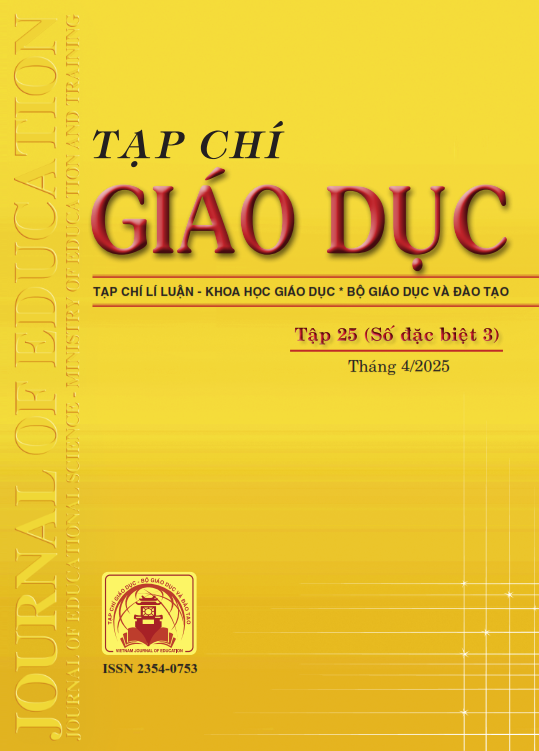Nhận thức của giáo viên tiếng Anh về việc lồng ghép giá trị đạo đức vào bài dạy ở trường phổ thông
Tóm tắt
In response to international integration, the rapid development of the Fourth Industrial Revolution, and the emphasis on promoting moral education, this article examines EFL teachers’ perceptions of embedding moral values into teaching at several high schools in Soc Trang province, Vietnam, aiming at meeting the objectives of developing students’ competencies and qualities as outlined in the 2018 General Education Curriculum. This study indicates that all four interviewed teachers had a positive perception of the importance of embedding moral values, and high possibility that moral values could be embedded into EFL lessons. However, they encountered several challenges in doing so. The findings highlight the need for support from relevant stakeholders to help teachers effectively embed moral values, enhance the quality of English language teaching, and align with the curriculum’s goals.
Tài liệu tham khảo
Akbari, R., & Tajik, L. (2012). Second-language teachers’ moral knowledge base: A comparison between experienced and less experienced, male and female practitioners. Journal of Moral Education, 41(1), 39-59. https://doi.org/10.1080/03057240.2011.630384
Bộ GD-ĐT (2018a). Chương trình giáo dục phổ thông - Chương trình tổng thể (ban hành kèm theo Thông tư số 32/2018/TT-BGDĐT ngày 26/12/2018 của Bộ trưởng Bộ GD-ĐT).
Bộ GD-ĐT (2018b). Chương trình giáo dục phổ thông môn Giáo dục công dân (ban hành kèm theo Thông tư số 32/2018/TT-BGDĐT ngày 26/12/2018 của Bộ trưởng Bộ GD-ĐT).
Bộ GD-ĐT (2018c). Chương trình giáo dục phổ thông môn Tiếng Anh (ban hành kèm theo Thông tư số 32/2018/TT-BGDĐT ngày 26/12/2018 của Bộ trưởng Bộ GD-ĐT).
Bộ GD-ĐT (2022). Hội nghị đánh giá tình hình triển khai Chương trình giáo dục phổ thông 2018. https://moet.gov.vn/tintuc/Pages/CT-GDPT-MOI.aspx?ItemID=8330
Creswell, J. W. (2014). Research Design: Qualitative, Quantitative and Mixed Methods Approaches (4th ed.). Thousand Oaks, CA: Sage.
Hồ Văn Thống, Nguyễn Văn Đệ, Phan Trọng Nam (2023). Một số biện pháp đào tạo, bồi dưỡng giáo viên nhằm triển khai thực hiện Chương trình giáo dục phổ thông 2018 ở vùng Đồng bằng Sông Cửu Long. Tạp chí Giáo dục, 23(6), 45-50.
Huỳnh Thanh Bình (2023). Thực trạng quản lí hoạt động giáo dục đạo đức cho học sinh trung học phổ thông ở huyện Hòa Bình, tỉnh Bạc Liêu. Tạp chí Khoa học, Trường Đại học Đồng Tháp, 12(04S), 82-90. https://doi.org/ 10.52714/dthu.12.04S.2023.1184
Le, C. V. (2018). A critical analysis of moral values in Vietnam-produced EFL textbooks for upper secondary schools. In: Widodo, H., Perfecto, M., Van Canh, L., Buripakdi, A. (Eds.), Situating moral and cultural values in ELT materials. English Language Education (Vol. 9, pp. 111-129). Springer International Publishing AG. https://doi.org/10.1007/ 978-3-319-63677-1_7
Malterud, K., Siersma, V. D., & Guassora, A. D. (2015). Sample size in qualitative interview studies: guided by information power. Qualitative Health Research, 26(13), 1753-1760. https://doi.org/10.1177/1049732315617444
Minh Thu (2022). Đẩy mạnh giáo dục đạo đức, lối sống cho học sinh. https://dangcongsan.vn/giao-duc/day-manh-giao-duc-dao-duc-loi-song-cho-hoc-sinh-628690.html
Morse, J. M. (2000). Determining sample size. Qualitative Health Research, 10(1), 3-5. https://journals.sagepub.com/ doi/abs/10.1177/104973200129118183
Noddings, N. (2007). Aims, goals, and objectives. Encounters in Theory and History of Education, 8. https://doi.org/10.24908/eoe-ese-rse.v8i0.571
Nguyen, T. N. H., Huynh, H. H., & Nguyen, T. B. N. (2024). Investigating Vietnamese EFL high school teachers’ attitudes toward teaching moral values. Tạp chí Khoa học, Trường Đại học Đồng Tháp, 13(7), 60-69. https://doi.org/10.52714/dthu.13.7.2024.1338
Phạm Việt Thắng (2017). Giáo dục đạo đức cho học sinh sinh-viên trong bối cảnh toàn cầu hóa. Tạp chí Khoa học Giáo dục, 141, 65-69. http://vjes.vnies.edu.vn/sites/default/files/bai15_141_06_2017.pdf
Phùng Đình Mẫn, Văn Tám (2020). Thực trạng và biện pháp quản lí công tác giáo dục đạo đức cho học sinh các trường trung học cơ sở huyện Tây Sơn, tỉnh Bình Định. Tạp chí Giáo dục, 478, 55-59.
Qoyyimah, U. (2016). Inculcating character education through EFL teaching in Indonesian state schools. Pedagogies: An International Journal, 11(2), 109-126. https://doi.org/10.1080/1554480X.2016.1165618
Savela, T. (2017). The advantages and disadvantages of quantitative methods in schoolscape research. Linguistics and Education, 44, 31-44. https://doi.org/10.1016/j.linged.2017.09.004
Shaaban, K. (2005). A proposed framework for incorporating moral education into the ESL/EFL classroom. Language, Culture and Curriculum, 18(2), 201-217. https://doi.org/10.1080/07908310508668742
Soleimani, N., & Lovat, T. (2019). The cultural and religious underpinnings of moral teaching according to English language teachers’ perceptions: a case study from Iran. Journal of Beliefs & Values, 40(4), 477-489. https://doi.org/10.1080/13617672.2019.1634876
Thủ tướng Chính phủ (2019). Chỉ thị số 31/CT-TTg ngày 04/12/2019 về tăng cường giáo dục đạo đức, lối sống cho học sinh, sinh viên. https://chinhphu.vn/default.aspx?pageid=27160&docid=198484
Thùy Linh (2021). GS. Vũ Minh Giang: Đâu phải bỏ “Tiên học lễ, hậu học văn” là có học sinh sáng tạo. https://giaoduc.net.vn/gsvu-minh-giang-dau-phai-bo-tien-hoc-le-hau-hoc-van-la-co-hoc-sinh-sang-tao-post222705.gd
Veugelers, W. (2010). Moral Values in Teacher Education. International Encyclopedia of Education, 3, 650-655. https://doi.org/10.1016/B978-0-08-044894-7.00635-7
Đã Xuất bản
Cách trích dẫn
Số
Chuyên mục
Giấy phép

Tác phẩm này được cấp phép theo Ghi nhận tác giả của Creative Commons Giấy phép quốc tế 4.0 .












